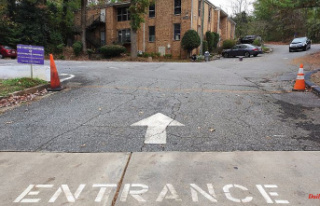After the bloody riots in Kazakhstan at the beginning of the year, Head of State Tokayev ousted his predecessor Nazarbayev. He promises comprehensive reforms for the presidential election. For Germany, the resource-rich country is the most important partner in Central Asia.
During her recent visit to Kazakhstan, Foreign Minister Annalena Baerbock extended her hand to the leadership of the resource-rich country, also with a view to the presidential election. She offered Germany, where many immigrants from the ex-Soviet republic live, as an alternative for cooperation away from powerful neighbors China and Russia. It is true that she did not meet President Kassym-Jomart Tokayev in the capital Astana. But even so, the Green politician should have felt a slightly different political wind. The 69-year-old Tokayev wants to be elected to office on November 20 for a seven-year term - for the last time.
Tokayev, who has been in office since the resignation of the authoritarian President Nursultan Nazarbayev and was elected for the first time in 2019 with 70.96, promised the people a "new Kazakhstan" after a constitutional change in June. He has announced a tough course against corruption and nepotism - and more equal opportunities. "We urgently need to change the situation," he said before the election, referring to the minimum wage of 60,000 tenge (around 125 euros). "It's practically impossible to live on that money."
It has been a good ten months since the oil and gas-rich country was shaken by bloody riots. More than 200 people died in January as protests against high prices and social injustice turned into an unprecedented power struggle. At the time, Tokayev gave an order to shoot at the demonstrators, whom he described as "terrorists." And he had to ask Kremlin chief Vladimir Putin for help from the Russian-dominated military alliance Collective Security Treaty Organization (CSTO).
The soldiers quickly calmed the area down and withdrew. But Tokaev not only had influential officials employed by his predecessor Nazarbayev arrested in the security structures. Above all, he ousted Nazarbayev himself, who continued to hold high offices and unlimited powers. The family members of the first Kazakh President lost positions in politics and business. Some found themselves in prison - and now have to hand over the bribes stolen through enrichment to the state treasury. Last but not least, Tokayev did away with the personality cult surrounding Nazarbayev, for example by giving back the name Astana to the capital, which was temporarily named after his first name Nursultan. He also had the death penalty, which was no longer imposed, abolished.
If the approximately twelve million voters are now called to the polls, Tokayev is likely to see it as a kind of vote of confidence. He has promised not to place members of the president's family in posts in state-owned companies and parties, as has been the norm up to now. He also announced that he would revive the dialogue that had been lost between the power apparatus and civil society. Words like pluralism and transparency or the slogan "Multiple opinions - one nation" can be heard in public. The President has had his own powers curtailed. International election observers from the Organization for Security and Co-operation in Europe (OSCE) also emphasize the many changes.
However, they criticize the fact that recommendations for easier registration of candidates for election or more transparency in media ownership are not being implemented. It is also tricky that the president continues to enjoy special protection of his "honor and dignity" by law, which makes criticism difficult. For Tokayev there is no alternative in sight. The other five candidates admitted to the election are considered to have no chance. The incumbent is supported by a broad alliance of three parliamentary parties, trade unions and business organizations in the country with its 18.5 million inhabitants. But according to the amended constitution, a president can only be elected once in the future - although the term of office has been increased from five to seven years.
The West hopes that Tokayev, who is experienced in international diplomacy, could be serious about a certain cosmopolitanism. Although he feels indebted to Putin for saving him from falling in January, Tokayev has been polite but firm in recent meetings with the Kremlin boss -- publicly refusing to support Russia's war against Ukraine, for example.
Unlike ruler Alexander Lukashenko in Belarus, who is economically at the mercy of Putin for better or worse and is subject to sanctions, Tokayev can choose partners thanks to the rare earths and other mineral resources. During her visit to Astana at the end of October, Foreign Minister Baerbock made it clear that Germany wants to keep Kazakhstan as its most important partner in Central Asia. Without naming names, she said, countries in many parts of the world are trying to expand their influence "not only with military force, but also through economic deals that hide a web of dependencies". Germany wants other economic relations, "fair, on an equal footing, without gag loans and without a hidden agenda".












